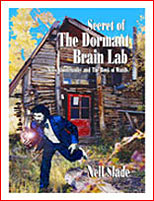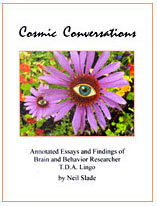Sleep is a necessary part of
life, a time in which brain and body repair and rejuvenation occurs.
Different types of processes happen throughout the night during sleep,
and are marked by changes in brainwave patterns that may be monitored.
A normal sleep cycle goes from
light sleep into deep sleep and then back out to the lighter dreaming
REM (rapid eye movement) sleep. Although REM sleep is universally
thought to be when dreams occur, there is evidence that dreams may also
occur during non-REM periods additionally.
Most people have about four of
these cycles during an optimal seven to eight hour night's sleep.
Lack of sleep has these
results:
1 night missed:
fatigue, reduced attention span, loss of short
term memory.
2-3 nights missed:
poor coordination, muscle twitches, impaired
judgment, blurred vision, nausea, microsleep (in which the body
involuntarily falls asleep for a few seconds without the individual
being conscious of it.
4-5 nights missed:
extreme irritability, hallucinations, delusions
6-8 nights missed:
psychotic-like behavior, paranoia
9+ nights missed:
fragmented thinking (incomplete thinking/expression), unresponsive
conscousness.
11 nights missed:
death from a breakdown of bodily functions. (Rats die after 2 weeks
without sleep).
The brain repairs itself during
sleep and reverses the effects and damage from free radicals and normal
metabolism.
Sleep may act like computer "defragmentation-
during sleep, the brain takes information gathered during the day and
sorts and catalogs it into useful skill and memory.
LEARNING
Creativity is the result of
associations of memories made during rest:
-
When a person is taught a
new skill, his or her performance does not improve until he or she
receives at least eight hours of sleep. AN extended period of sleep
ensures that the brain will be able to complete the full sleep
cycle, including REM sleep. The necessity of sleep for learning
could be due to the fact that sleep increases the production of
proteins while reducing the rate at which they are broken down.
Proteins are used to regenerate the neurons within the brain.
Without them, new synapses may not be able to be formed, thus
limiting the amount of information a sleep-deprived individual can
maintain.
-
-
People taught a skill and
then deprived of non-REM sleep could recall what they had learned
after sleeping, while people deprived of REM sleep could not. We
typically spend more than 2 hours each night dreaming. The REM
period of sleep seems to be crucial for reorganizing experiences
into useful skill and memory.
-
-
In one study, there were
two groups of individuals who trained for a new keyboard skill and
were tested on it 12 hours later. One group trained at 10 AM and was
tested at 10 PM. The other group trained at 10 PM and was tested the
next morning at 10 AM, after sleep. The group that slept
scored significantly higher in skill.
The TEMPORAL LOBES are inactive
after sleep deprivation, showing problems with processing language which
is processed in this left side of the brain.
The FRONTAL LOBES show lack of
creative syntheses and ideation after lack of sleep. However, after a
SHORT NAP, the frontal lobes and pre-frontal cortex are refreshed. It is
well known that a short nap will reveal a creative solution. Thomas
Edison is well known for taking advantage of this, using his
cat naps to help find a solution to a stubborn problem.
The IMMUNE SYSTEM is weakened
without sleep. One study stated that people who sleep less than four
hours per night are three times more likely to die within the next six
years. Although the longest a human has remained awake was eleven days,
rats that are continually deprived of sleep die withing two to five
weeks, generally due to their severely weakened immune system.
LUCID DREAMING
As a rule, the pre-frontal
cortex remains largely inactive during dreaming. In dreaming we likewise
think little about the future, simply going along with the dream
narrative without question. In this vein there seems a significant
attenuation of attention during dream as well as a loss of
self-reflection.
In waking life the prefrontal
lobe plays an important role in maintaining a sense of self-identity,
and particularly an ability for self-reflection. With these abilities
"off-line" during dreaming, the dreamer has little ability to reflect on
the situation, or even notice the strangeness of events experienced in
the dream state.
On the other hand, people who
LUCID DREAM show a signature spike in frontal lobes brain waves, and
appear to experience a dream with continuing the activation of the
frontal lobes. The lucid dream seems to be a world "between two worlds",
that of the pure dream and that of waking reality.
It appears that lucid dreaming
is a bridge between the imagination/memory of the dream state and the
insight and conscious rational processes available to the frontal lobes.
Lucid dream is a skill that can
be learned to a certain extent, provided there is a conscious and
willing effort to do so. To encourage a conscious lucid dream one may a)
Keep a dream journal b) stay in bed after waking up and reviewing the
previous dream, then falling back to sleep c) Taking a nap only a couple
of hours after waking in the morning, or early in the day.
THE AMYGDALA and SLEEP
Depression is associated with
disordered rapid eye movement REM sleep. The amygdala contains neurons
that project into the brainstem as well as other major parts of the
brain, and it appears to be involved in modulating REM sleep.
Investigators from the Sleep and Neuroimaging Laboratory, University of
California, Berkeley, presented evidence consistent with the claim the
REM sleep functions in part to facilitate emotional regulation. This
means that normal reactive processes of the amygdala (fear and negative
response in this experiment) are "depotentiated" and defuse. I.e., the
same negative stimulus loses its ability to cause a negative reaction
after sleep.
The experiment was as follows-
a subject was shown an image that caused an negative amygdala reaction.
Either the person stayed awake for 12 hours, or was allowed to sleep.
The image was re-shown again, to either produce a similar negative
reaction, or show a decreased defused non-reaction. The experiment
demonstrated-
BENEFITS of ENOUGH SLEEP
Weight loss: Lack of sleep causes
a decrease in plasma leptin and an increase in gherlin levels. Leptin
curbs one's appetite, and ghrelin gives you an appetite. Sleep keeps
these substances at a normal level.
Cancer Preventative: Sleeping too
much or too little increases your chances of dying from all causes by up
to 15 % according to some studies. People who get enough sleep show
lower levels of cancer.
Growth Hormone is released during
sleep from your pituitary gland, even for adults. This strengthens your
bones, increases muscle mass, helps you lose body fat, increases protein
synthesis for healthy internal organs.
Sleep stimulates your immune
system and supports your pancreas' ability to make insulin.
GET ENOUGH SLEEP
Here are some tips that will help
you sleep better and get enough sleep:
Remind yourself the reasons
for getting enough sleep- so you do!
Teenagers, due to hormone
changes, tend to sleep two hours later at night than adults, and
tend to rise two hours later. Don't be alarmed, and understand this
natural tendency and difference.
Go to bed at roughly the same
time each night.
Before you sleep, visualize
how you would like the next day to be. Ask yourself a question that
you want answered why you sleep and expect to know the answer upon
awakening, spontaneously revealed, or revealed in your dream.
Keep your bed and
bedroom attractive and pleasant, and free from unnecessary clutter.
Keep lights off until morning,
even if you have to use the bathroom. This will allow melatonin
(sleep brain chemical) to continue.
Use a white noise or
relaxation machine or CD to help fall asleep.
Keep earplugs or a sleep mask
near your bed and use if helpful to keep out distractions.
Watch what you eat immediately
and some time before bed, and keep notes what may cause problems.
Generally, alcohol, high
protein, and high sugar foods will disturb sleep. Consider a high
complex carbohydrate with a small amount of protein to be a sleep
inducing snack. This makes tryptophan available to the brain and
promotes sleep.
Socks may help you to stay
warm and comfortable in bed.
Avoid large amounts of liquids
before bed so you don't have to go the the bathroom often in the
middle of the night.
A hot bath or shower can relax
you.
Lavender oil dropped on your
pillow or bed is a soothing and relaxing scent.
Get sufficient physical
exercise during the day.








